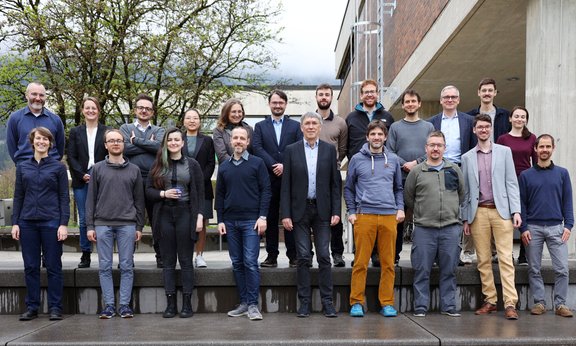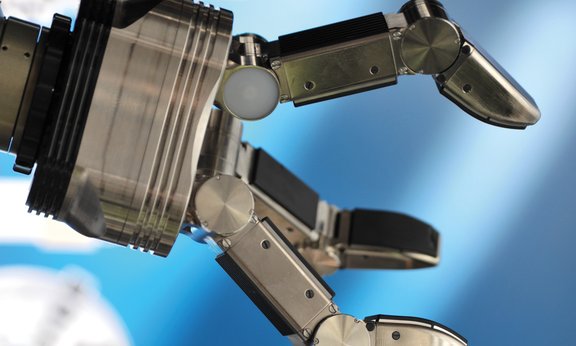Master’s Programme Computer Science
You want to advance your theoretical and practical knowledge of computation?
Computer Science is the key to a digitalised world. It is the study of the foundations, techniques and applications used for the automated processing of digital information.
Students enrolled in the Master’s Degree Programme advance their theoretical and practical knowledge of computation in order to engage in research and invent new technologies.
Study code
UC 066 921
All studiesStudent advisory serviceMinorExtension ProgrammeAround the study
FAQ
Students in the Master's Programme learn to
- understand today's digital technologies and develop future ones;
- master the interaction of software and hardware in distributed systems of all sizes;
- optimise the interface between the real world and digital systems;
- apply methods of logic and machine learning in a targeted and responsible manner;
- understand systematic approaches to solving large-scale computational problems;
- contribute to research on new methods
- specialise in a particular area of computer science.
The Master’s Programme in Computer Science enhances and expands the skills and knowledge in the field of Computer Science acquired during the Bachelor’s Programme in Computer Sciences. In particular, the programme imparts skills for independent scientific work, prepares for the doctoral programme and enables the specialisation in a key area or application field in computer science.
In particular, specialisation can be achieved in one of three subject areas:
- Logic and Learning
- Secure and Distributed Computing
- Perception, Interaction and Robotics
The following key competences are taught or deepened in the Master's Programme Computer Science:
- Abstraction, formalisation and critical examination of given problems;
- Ability to systematise approaches to solutions and to solve problems independently and creatively;
- comprehensible presentation and scientific documentation of the solutions developed as well as project management;
- Reflection on the effects of technologies from legal, ethical and social points of view.
A solid scientific education in computer science as well as the application of what has been learned to concrete problems are the focus of the education. The language of instruction is English.
The Master's Programme Computer Science qualifies students for highly qualified and innovative research and development work in the field of systematic and automated information processing. Graduates master problem-solving strategies that make them attractive for many responsible positions in all sectors with a technological connection. The imparted ability for independent scientific work prepares students for jobs in academic or industrial research.
Graduates tracking: Shows which occupational fields students enter after graduation
Faculty of Mathematics, Computer Science and Physics Examination Office Information for students with disabilities
Curriculum
From the field

Liedtexte immer einfacher und emotionaler
Englischsprachige Liedtexte sind immer simpler gestrickt und leichter zu verstehen, auch aufgrund eines geringeren Wortschatzes – insbesondere bei Rap- und Rocksongs. Außerdem wurden die Texte tendenziell emotionaler und persönlicher, zeigt ein Team um Eva Zangerle vom Institut für Informatik in einer im Fachblatt „Scientific Reports“ veröffentlichten Studie, in der die Entwicklung in den vergangenen 40 Jahren unter die Lupe genommen wurde.

Quanten- und Supercomputer in einem
Ein Hybrid-System aus Quantencomputer und klassischem Hochleistungscomputer soll nun in Österreich entstehen – ein wegweisendes Projekt sowohl für die Physik als auch für die Informatik. Geleitet und koordiniert wird das Vorhaben von der Universität Innsbruck.

Effizienter rechnen
Innsbrucker Informatiker:innen haben in einem von der EU geförderten Projekt gemeinsam mit Partner:innen aus Italien, Schweden und der Schweiz dazu beigetragen, die Medikamentenforschung auf Hochleistungsrechnern deutlich effizienter zu gestalten.

wissenswert Februar 2022
In dieser Ausgabe sprechen Innsbrucker Wissenschaftler über den Klimarat der Bürger*innen, Studierende berichten von ihren Forschungsprojekten und Sie erfahren, wie man sein Wissen über Tirols Tierwelt zertifizieren lassen kann. Darüber hinaus gibt es alle Informationen zum Studienstart und zu neuen oder neugestalteten Studienangeboten im kommenden Wintersemester.
Related studies

Civil Engineering (Master)
Diplom-Ingenieur*in

Environmental Engineering (Master)
Diplom-Ingenieur*in








